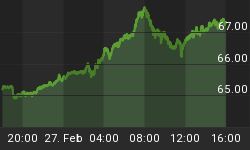In response to Hyperinflation Silliness (Times Two), reader William says "I think you are saying gold benefits no matter what. I’m confused."
That’s a good discussion topic. I have commented on this before but let’s recap with a few more bullet points as to when gold does well and when it doesn’t.
Gold Does Well in These Environments
1. Deflation
2. Hyperinflation
3. Stagflation
4. Decreasing faith that central banks have everything under control.
5. Rising credit stress and fear of defaults
Gold Does Poorly in These Environments
1. Disinflation (1980 to 2000 is a perfect example. There was inflation every step of the way but gold got clobbered).
2. Increasing faith in central banks’ ability to keep things under control (Mario Draghi’s "Whatever it takes" speech triggered a prime example)
Gold does worst in prolonged disinflation and in periods that have rising faith in central banks.
I suppose one could condense this all down to increasing or decreasing faith that central banks to have everything under control. Alternatively one might think of periods of rising or abating credit stress.
Hopefully the bullet points highlight the times in ways that are more easily understandable than a simple "rising faith, falling faith" duality.
Right now I suggest that it’s pretty clear that markets again are questioning central banks’ ability to keep things under control. In Europe, especially Italy, people wonder if their deposits are any good.
There is a lot of credit stress internationally coupled with central banks actions that have gotten totally out of hand. Meanwhile, central banks have made little or no progress on their stated goals.
How and When Does This End?
I covered the end game a bit in How and When Does This Mess End?
The one thing we can easily dismiss for now is hyperinflation in the senior currency (the US dollar).
We are clearly in an asset bubble, and by definition, asset bubbles deflate, not rise infinitely. Secondly, the problems in Europe and Japan dwarf those of the US.
Should countries in the Eurozone exit the Eurozone, they could easily see hyperinflation.
To understand likely scenarios one must understand the difference between money and credit.
Many hyperinflationists have gone wrong because they do not understand the difference; they do not understand excess reserves, and they do not understand the true meaning of helicopter money.
As noted in Hyperinflation Silliness (Times Two), Jeff Nielson was the latest. There will be more.















